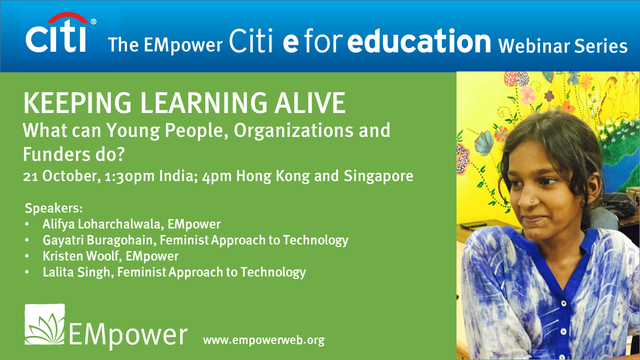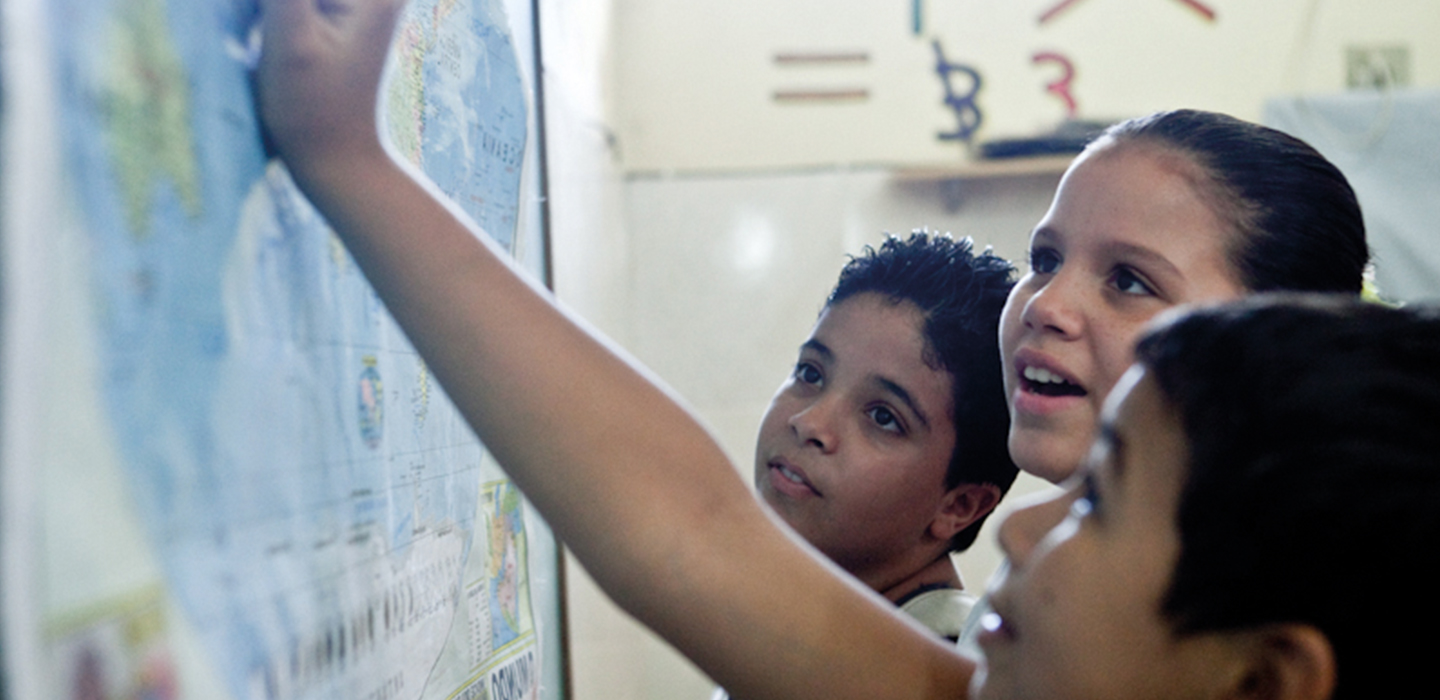Latest News
What can young people, funders and organizations do to keep learning alive? — An EMpower and Citi e for education Webinar
Posted 27 October 2020 in EMpower News, Grantee Partner News | Share

COVID-19 poses monumental challenges to the young people and communities we work with. We need to form coalitions, share resources, scale what works, innovate, and build missing linkages. For the third chapter of its webinar series, EMpower and Citi e for education hosted a webinar on ‘Keeping Learning Alive’: What can Young People, Organizations, and Funders do? Speakers from EMpower and grantee partner Feminist Approach to Technology (FAT) shared examples of how non-profits and funders within the inclusive learning space can collectively strengthen their work with young people by improving access to non-traditional livelihoods careers; changing perceptions; and building an ecosystem of support.
In case you were unable to attend the webinar or want to share the recording with someone who might be interested, please click here.
Joyce Skidell, Director of FX E-Sales, Citibank, spoke about the Citi e for education campaign, highlighting its impact on young people globally. EMpower is proud to have been a partner of Citi’s campaign since it first started in 2013. This support has enabled EMpower to directly reach more than 110,000 young people, including 63,000 girls and young women! Now, more than ever, this support is crucial as young people globally experience increased hardships because of the pandemic.
Kristen Woolf, Vice President of Programs at EMpower, introduced EMpower’s work globally. She set the stage for the panelists, Alifya Loharchalwala (Senior Program Officer, EMpower), Gayatri Buragohain (Executive Director, Feminist Approach to Technology), and Lalita Singh (Trainer and Alumni, Feminist Approach to Technology). Zooming in on EMpower’s programmatic focus in India, Alifya talked about EMpower’s intentional push on gender programming, especially keeping adolescent girls in mind. Recognising the cross-cutting quality of gender programming across thematic areas, Alifya shared the value of Building Bridges, an EMpower Learning Exchange series in India. Since its launch last year, Building Bridges, has been able to achieve two key objectives:
- Deep-diving into existing knowledge and expertise of our grantee partners in India
- Supporting the exchange of dialogues and resource sharing among partners
The Building Bridges initiative has already produced positive results in the form of pilots launched by partners who want to tap into each other’s existing expertise and learn from each other’s experiences rather than reinvent the wheel. Alifya shared how education has been an important site of reflection on program delivery, given the impact of COVID-19 on formal and informal learning setups. In July 2020, EMpower piloted a STEM (Science, Technology, Engineering and Maths) Collective under the aegis of Building Bridges - the aim of this collective is to train 35 teachers from six partner organisations who run girl-focused programs.
Gayatri shared her own story which was replete with challenges in pursuing a STEM career in India, a country which currently ranks seventh of the 10 lowest performing countries in Female Labour Force Participation worldwide. The story culminated in the launch of Feminist Approach to Technology (FAT), a non-profit that works with adolescent girls from opportunity-deprived communities to increase their access, interest and participation in technology. Their programs focus on breaking societal stereotypes and attitudes, encouraging and enabling women to feel comfortable in working with technology. They mainly work with adolescent girls from socially and economically disadvantaged families who come from urban settlements. FAT’s programs include STEM training, basic computer training, skill-building courses and practical assignments.
Trainer (and alumni) at FAT, Lalita spoke about her journey from student to trainer, bearing testament to the transformative potential and nature of such programs. While Lalita delved into the impact of COVID-19 at a personal and professional level, Gayatri spoke about its effects at the organisational level. She also highlighted FAT’s response to mitigate some of the challenges in the wake of the pandemic, such as girl-led relief efforts and providing girls support with technological access. Gayatri shared: “Girls’ ability to work with each other and support each other during this time is helping us wade through this pandemic.”
On being asked about her aspirations for the STEM Fellowship that FAT plans to launch in 2021, Gayatri said that they hope to add a stream of effective and inspiring STEM trainers and teachers and more importantly, build an ecosystem of support available to adolescent girls and young women in pursuing STEM related careers. Giving us a sense of her vision for the STEM Collective, Gayatri made a powerful statement: “Unless we share in building the curiosity of STEM, and simplifying it for girls, we will not have enough of these programmes. If we want longer-term change and gender balance, we should share so that others can also adopt similar models.”
Lalita had an inspiring parting message for girls who want to pursue STEM: “I have been able to learn and grow at FAT. Our society thinks that girls cannot do anything in STEM. I want to tell girls that you can do it, explore STEM fields without any fears of failure!”
View All News
More Latest News
- We are Hiring: Programme Consultant, Peru
- Posted 23 April 2024
- A Word with Prarthana Kumar
- Posted 16 April 2024
- Finding the Power
- Posted 16 April 2024
Upcoming Events
Connect with EMpower
Stay up-to-date on the latest EMpower news, highlights from our grantee partners, upcoming events, and more.
Make a Difference with EMpower
Our Board Directors and the Leadership Council underwrite all of our Management, General and Fundraising expenses, so 100% of your donation goes directly to empowering marginalised young people.

